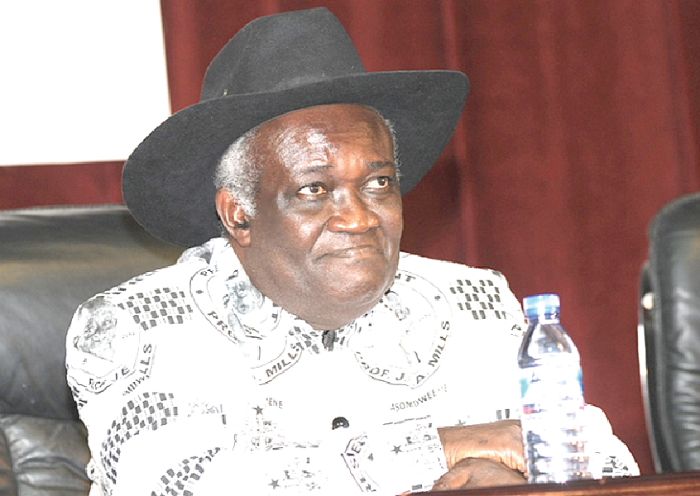
Election of MMDCEs may lead to blatant disregard of directives
The election of Municipal, Metropolitan and District Chief Executives (MMDCEs) may result in the blatant disregard of directives from the central government.
It may also lead to local governments threatening the central government with legal suits for one thing or another.
These are some of the contributions to a major reform policy on decentralisation facing the country currently, that is, the election of MMDCEs.
The contributions were made by the doyen of decentralisation in Ghana, Prof. Kwamena Ahwoi, during the launch of his second book, “Decentralisation in Ghana: A collection of Essays,” in Accra last Tuesday.
Homecoming
The book launch was a lively affair, with the participation of former ministers of state of the National Democratic Congress (NDC), including the former Vice-President, Mr Paa Kwesi Amissah-Arthur; representatives of the former President, Mr John Mahama; representatives of the minority caucus in Parliament led by the Minority Leader, Mr Haruna Iddrisu; students, lecturers, administrators and public officials of decentralisation in the country.
Also present was the Minister of Local Government and Rural Development (MLGRD), Hajia Alima Mahama.
Excerpts
Prof. Ahwoi, who read excerpts from his book, breaking from the norm of delivering a speech as the author, chose this section to read out for the pleasure of the Executive Director of the Institute of Democratic Governance (IDEG), Dr Emmanuel Akwetey.
IDEG has been engaging various constituents, including political parties, on multi-party governance reforms, that would include the partisan election of MMDCEs at the district level.
He also read an excerpt for the pleasure of the Minister of Local Government and Rural Development.
The excerpt defined the difficulties that the person charged with decentralisation had to face in prosecuting that agenda.
The minister usually had to be a sort of “first among equals” because of the multi-sectorial dimensions of decentralisation and give directives across his or her sector to other sectors and ministries.
That was most often resented by other ministers, resulting in friction.
Prof. Ahwoi said the adoption of the Inter-Ministerial Coordinating Committee on Decentralisation (IMCCD), that brought together all critical sectors for the deliberation on and implementation of decentralisation policies, was Ghana’s way of overcoming that challenge.
Self-sacrificing
In his contributions, the Managing Director of Winmat, Mr Edward Addo, described the author’s work as “a tremendous act in sharing experiences on descentralisation”.
He expressed the hope that the publication would further enlighten all students, researchers and academicians on the area.
He announced that the book would after the launch be on sale at all major bookshops across the country, including the Methodist and Presbyterian bookshops, Challenge and EPP books.
In a review of the work, a Senior Research Fellow of IDEG, Prof. Atsu Ayee, said the 360-page book with 15 chapters had eight chapters covering the policy, legal and institutional framework of decentralisation in the country.
He said the book consisted of a collection of lectures, seminar presentations, consultancy reports and conference addresses, and although 10 chapters were referenced, the others were not because of the nature of the issues discussed.
Prof. Ayee said the book covered the building blocks of decentralisation in Ghana and generally Africa, with the comparative perspectives on the election of district authorities.
“The book has certainly updated the literature of decentralisation in Ghana and deepened the understanding on the implementation of the cross-cutting policy,” he said.
Writer’s email:
